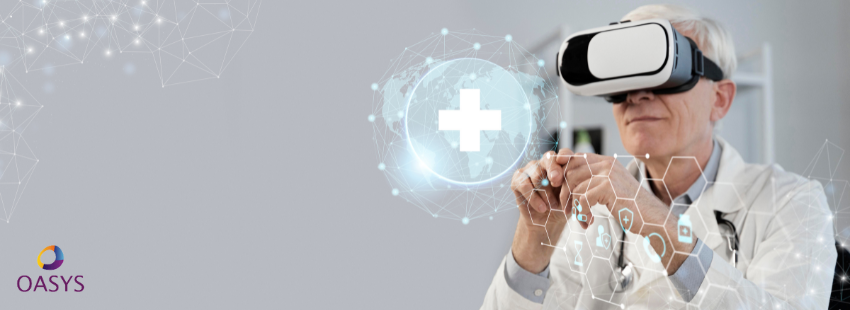Introduction
In recent years, Artificial Intelligence (AI) has made significant strides in revolutionizing various industries, and healthcare is no exception. The integration of AI technologies in healthcare is transforming patient care, making it more efficient, personalized, and cost-effective. In this blog, we will delve into the impact of AI on the healthcare sector, exploring its applications, benefits, challenges, and the future of AI-powered patient care.
AI in Healthcare: Applications
By harnessing the power of artificial intelligence, healthcare professionals are now equipped with cutting-edge tools to enhance their decision-making processes, streamline administrative tasks, and provide more personalized healthcare services. Here, we will explore the diverse applications of AI in healthcare, from early disease detection to drug discovery, and how these advancements are transforming the way we approach medical practices and patient well-being.
1. Disease Diagnosis and Detection
AI-powered systems can analyze vast amounts of patient data, including medical records, imaging scans, and genetic information, to assist in the early detection and diagnosis of diseases. For instance, AI algorithms can analyze medical images, such as X-rays, CT scans, and MRIs, to identify anomalies or potential diseases, often with higher accuracy and speed than human radiologists.
2. Treatment Personalization
AI can help create personalized treatment plans by considering a patient's unique genetic makeup, medical history, and lifestyle. These plans can optimize medication dosages, surgical procedures, and rehabilitation programs, increasing treatment efficacy and reducing side effects.
3.Predictive Analytics
By processing patient data, AI algorithms can predict disease outcomes, identify high-risk patients, and even forecast disease outbreaks. This can help healthcare providers allocate resources more effectively, implement preventive measures, and improve patient management.
4. Telemedicine and Virtual Health Assistants
AI-driven chatbots and virtual health assistants are becoming increasingly popular in providing healthcare advice, scheduling appointments, and offering patient support. They can answer routine questions and assist with medication reminders, thereby reducing the workload on healthcare staff.
5. Drug Discovery and Development
AI can significantly speed up the drug discovery process by simulating and predicting the interactions between potential drug compounds and biological systems. This can potentially reduce the time and cost of bringing new medications to market.
Benefits of AI in Healthcare
1. Improved Diagnostic Accuracy:
AI systems can process vast datasets, leading to more accurate and timely diagnoses, which can be crucial for conditions like cancer and heart disease.
2. Efficiency and Time Savings:
AI can automate repetitive tasks, allowing healthcare professionals to focus on more complex and critical aspects of patient care.
3. Personalized Medicine:
AI enables the development of treatment plans tailored to individual patient characteristics, enhancing treatment efficacy.
4. Cost Reduction:
AI can help reduce healthcare costs by optimizing resource allocation, minimizing errors, and preventing readmissions through predictive analytics.
5. Accessibility:
Telemedicine and virtual health assistants improve healthcare access for remote and underserved areas.
Challenges and Concerns
1. Data Privacy:
Handling sensitive patient data requires strict adherence to privacy regulations like HIPAA. Maintaining the security of medical records is essential.
2. Regulatory Compliance:
The healthcare industry is highly regulated, and integrating AI solutions must adhere to complex regulations and standards.
3. Bias in Data and Algorithms:
AI systems can inherit biases present in training data, which can lead to disparities in diagnosis and treatment recommendations.
4. Human Oversight:
AI should complement human healthcare professionals rather than replace them. Ensuring human oversight is crucial.
The Future of AI in Healthcare
The integration of AI in healthcare is still in its early stages, and the future holds even more promise. Potential developments include:
1. Federated Learning:
AI models could be trained across multiple healthcare organizations without sharing patient data, maintaining privacy while improving algorithms.
2. Advanced Robotics:
AI-driven robots may assist in surgeries and patient care, reducing the risk of human error.
3. AI-Enhanced Medical Education:
AI-powered platforms can improve medical education, offering simulations and decision-support tools to train healthcare professionals.
4. Continuous Monitoring:
Wearable devices equipped with AI could provide real-time monitoring, alerting patients and healthcare providers to potential health issues.
Conclusion
Artificial Intelligence is a game-changer in the healthcare industry, reshaping patient care by enhancing diagnosis, personalizing treatments, and improving the overall healthcare experience. While there are challenges to overcome, the benefits are substantial, making AI an essential component of the future of healthcare. As the technology continues to evolve, we can expect more innovations that will further revolutionize the patient care landscape.


